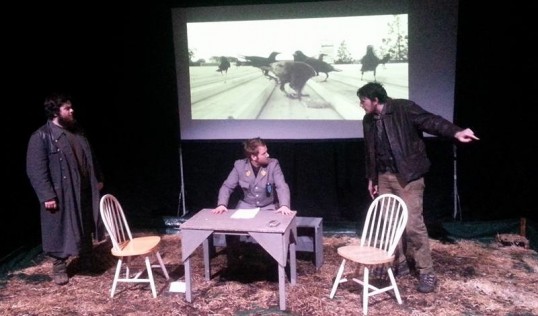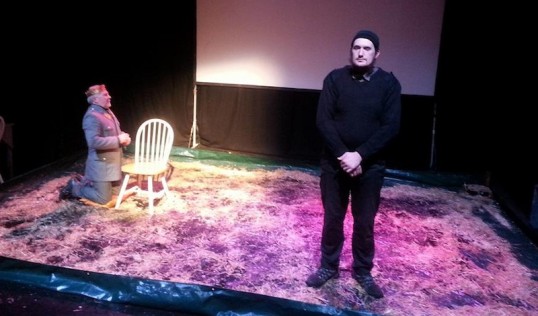The Bruce In Ireland
★★★☆☆ Brutal
Assembly Roxy: Mon 2-Thurs 5 Nov 2015
Review by Thom Dibdin
Bleak beyond remorse, Ben Blow’s new play about Edward Bruce’s bloody foray into Ireland, playing at the Assembly Roxy until Thursday, makes for cynical viewing.
Played out on a stage covered with squelching mud and straw, director Kolbrun Bjort Sigfusdottir ensures that there is an uneasy sense of impermanence to the whole project.
The Bruce in Ireland covers the historical events which followed Bannockburn, when Robert the Bruce’s younger brother went off to Ireland to open up a second front against the English. Fighting as he was, in support of those already at war with them, it technically did not break the year-long truce agreed between Scotland and England.
Instead of using a strictly accurate historical setting, Blow and Sigfusdottir have created a mid-to-late 20th century composite version of reality.
It has the feel of an Iain M Banks novel, containing guns and modern dress as well as the feudal warlords of the early 14th Century and all the religious baggage they bring. And like Banks, it creates a world which it is easy to feel has a relevance to contemporary times.
Gerry Kielty owns the stage as Edward Bruce, crazed to the point where the cracks are beginning to show, but not enough to appear overblown. There is a real danger to him, a casual disregard for any authority above that which is violently earned.
solid understanding
Against him, Chris Allan as Robert the Bruce is surprisingly tremulous. While there is meant to be an imbalance here, Allan doesn’t convince as a battle-winning leader. However, he and Mathew Jebb as Bishop Wishart give a solid understanding of the relationship between church and stage in an early scene where the Bruce is seeking absolution after Bannockburn.
Edward’s failure to acknowledge the role of the church and thus refuse to use it, proves to be just one of his poor judgement calls as leader of the Scottish forces.
Going to Ireland as a liberator from the English, it quickly turns out that he is as much an oppressor as they are. If not more so. In taking the role of King of Kings, he is not driven by a desire for freedom or liberation, but simply by war and a desire to continue the conflict.
Equally striking is Kirsty Eila McIntyre as a young woman, Failtrail, who ends up as Edward’s consort. Above her symbolic role as some kind of confessorial conscience for him, she gives a strong realism to the details the minutiae of life as a camp follower.
interesting tension
There is a particularly interesting tension when she and Kielty are alone on stage, although her role is also intrinsically linked to that of Philip Rainford as Edward’s personal guard, Galloglass. Both are able to speak with the kind of truth that rulers are not always happy to hear.
Jebb, who returns as Irish Chieftain O’Neall is consistently excellent, first supporting Edward but becoming increasingly exasperated with him. Allan also returns, with rather better purpose as dissenting irish chieftain O’Reilly. Douglas Garry completes the complement of Irish chieftains as MacDonnell.
There is something horribly relentless about the whole production, which has strong echoes of modern conflicts, notably Vietnam, with black-and-white war footage used for both narrative effect and as a backdrop.
Its success, and it is not one which is easy to watch, is in depicting that which is usually beyond comprehension. Here is a war that is pointless outside its own deathly internal logic, grinding on inexorably as a cold, eternal hell on earth.
However, these exact same traits mean that it doesn’t quite work as it might in terms of historical drama. The lack of signposts to the narrative of the conflict itself, the feeling of moving through a war, are not there. Time passes, but there is nothing to indicate whether it is days, weeks, months or years.
Nor does Tom Oakes’ sound design help as it might, largely because it is far from seamlessly inserted into the production. Stopping and starting at what appear to be random points.
However, this ambitious project is largely successful. There are undoubtedly tweaks to be made for future productions, but the current one is well worth seeing.
Running time: 1 hour 30 mins
Assembly Roxy Upstairs, 2 Roxburgh Place, EH8 9SU
Monday 2 – Thursday 5 November 2015
Daily: 8pm.
Age recommendation: 14+ (contains strong language and violence throughout)
Tickets available on the door or bookable at: http://www.brownpapertickets.com/event/2402633
ENDS






















